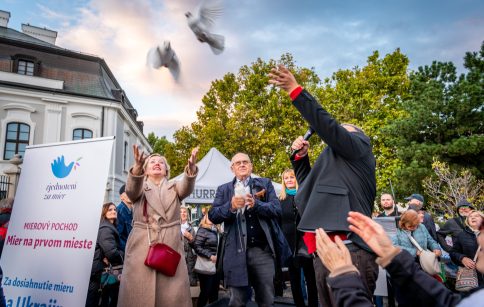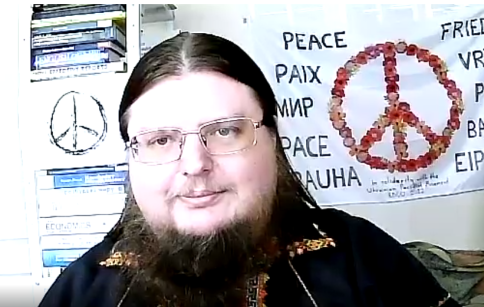IVETA KOMPISOVA, 09.06.2021
JUNE 9, 1843, THE FIRST WOMAN WAS WEARED A NOBEL PRIZE FOR PEACE FROM 1905, A NATIONAL OF PRAGUE
Her name is Bertha von Suttner (born Countess Kinská) and she is an extraordinarily inspiring figure who is far ahead of her time.
Within the rigid framework of the conventions of the highest society, she was able not only to preserve her individuality, but also to pursue her ideals in a vehement way. At a time when women’s views on politics were of little importance, she was able to engage in a relevant way in the Europe-wide debate, especially in the area of peace and alternative dispute resolution. Bertha was one of the most important figures in the peace movement at the turn 19. and the 20th century, she was one of the most influential journalists of her time and, as the founder of many peace societies, advocated for peace, the rights of women and national minorities. With his literary work and peacekeeping activities, he is at the forefront of the defenders of humanistic ideas in Europe in the second half of the nineteenth century.
She applied her extraordinary and broad-spectrum education, including the command of five foreign languages, to Vienna and Paris, where she established a long-standing friendship with Alfred Nobel, whom she inspired to create the Peace Prize.
Novel of 1889 Put down your weapons! changed the course of history
In the novel Put down your weapons! (Die Waffen nieder!), The author portrays the horrors of war with such authenticity that the work was initially rejected by several publishers, because it would allegedly shock the public too much, and after its publication in 1889 the book initially aroused a huge wave of resentment and great commotion. However, the book became a direct icon of pacifism and the peace movement, making Berta famous and placing the author among the leading representatives of the peace movement in the world. The novel has been translated into many languages (including Czech) and reissued. The novel takes place against the background of real military conflicts of the second half of the 19th century. century, in an unprecedented way questioned the notions of the nobility of war and the military profession. She explained to the general public the suffering of soldiers on the front, which was taboo at the time due to massive military propaganda, as well as the wider impact of the wars on society as a whole. However, it is one important thing that distinguishes it from a story that we would be happy to smile at today: it touches on topics that were still being discussed in the second half of the 19th century. century did not say that man would not be socially impossible. Efforts to rid the fighting of the aura of heroism were in the second half of the 19th century. century completely shocking. As well as pointing out inconsistencies in our thinking about individual and collective violence. The story is interwoven with philosophical reflections on the absurdity of wars and politics of power, but also with arguments in support of nascent peace movements. The author never hid the fact that this is an agitation novel. Book Put down your weapons! is still a very current source of ideas that need to be disseminated in order to promote peaceful dispute resolution alternatives, while creating space for cooperation on the path to peace and sustainable security. And she’s doing something else – to show that some human tendencies haven’t changed much in the last 132 years – for example: what’s usual is the same; what’s new is suspicious.
After the release of the novel Fold your weapons! became a leading figure in the European peace movement, published an anti-war magazine, stood at the birth of many peace associations and participated in the first peace congresses. She called for the creation of a European community, stood at the birth of the Interparliamentary Union (founded in 1889) and contributed to the establishment of the oldest institution for resolving international disputes – the Permanent Court of Arbitration, which was established in 1899 at a peace conference in The Hague on the initiative of Russian Tsar Nicholas II. Her work therefore has a considerable impact to this day, and even today it is very important to point out the continuing relevance of Betina’s ideas and their contribution to the field of peace policy. The criticism of the inhumanity of the war, which she made during her lifetime, is still valid, all the more so at a time when we have weapons with incredibly destructive properties and many countries around the world are in the midst of armed conflict or balancing on the edge of a new conflict.
Berta’s philosophy was influenced by the works of Immanuel Kant, Henry Thomas Buckle, Charles Darwin and Leo Nikolayevich Tolstoy, who gave her the book Put Your Arms! he compared Uncle Tom’s important American novel Chalúpek: “The abolition of slavery was preceded by a famous book by a woman, Mrs. Beecher-Stowe. May your book be followed by the abolition of the war. ”Although this did not happen, we can say without exaggeration that thanks to Berte von Suttner, the world of wars has waned. Her literary work, bound by tireless anti-war activism, led to the establishment of the Permanent Court of Arbitration.
Nobel Peace Prize
A letter that 7. January 1893 Berte, written by Alfred Nobel, is quite important: in it Nobel Berte indicated that he intended to establish a fund from which prizes would be paid to scientists, doctors, and that he also intended to establish a prize for those who somehow contributed to world peace and understanding between nations. After the death of Alfred Nobel (December 10, 1896), his will declare that his property is to be used for appreciation for those who have shown the greatest benefit to humanity during the previous year. Berte von Suttner – who was the inspiration for Nobel, especially in the idea of awarding the Peace Prize, is attributed a great deal of influence to this decision.
10. On December 1, 1905, Bertha was the first woman in the world to receive the Nobel Peace Prize, which she received on 18. April 1906 in Christiania (Oslo). Here she gave a lecture on The Development of the Peace Movement . He received this peace award for his book Put Your Arms !, for his lifelong peace efforts, as well as for his peace activism, which consisted of founding the cells of the peace movement. Even then, she continued to engage in the promotion of peace, the ideas of humanism and warnings of armaments and the threat of conflict. Von Suttner was a pioneer of many radical ideas. She argued that war was something we should eventually resign ourselves to as cannibalism. The aim of her efforts was to be able to lead calls where she had to go without a weapon. When Berta was received by President Theodore Roosevelt at the White House on October 17, 1904, he told her: ” World peace will come, it will come, but only step by step. “
“It simply came to our notice then. Although the goal is so obvious, seemingly close and easy to reach, the path to it is only step by step, and countless obstacles must be overcome. Moreover, this is a goal that millions of people do not yet see at all, which countless people either know nothing about or consider a utopia. Power interests also try to keep it unattainable, to keep everything the same. And the followers of the old, the existing, even have strong allies in the natural law of laziness, in the inertia that is inherent in all things, as if it were protection from danger and extinction. The struggle that pacifism still awaits is therefore not easy …. “ ,
in her lecture The Development of the Peace Movement , delivered by Bertha von Suttner in Oslo on 18. April 1906 at the official acceptance of the Nobel Prize.
It’s hard to say what Bertha would say about the First and Second World Wars, which she (fortunately) did not live to see. She died five weeks before the Sarajevo assassination in June 1914.
Despite the fact that Bertha was a native of Prague, few Czechs, let alone Slovaks, are aware of this globally recognized personality and her legacy. At the same time, the Berta Suttner Society, which deals with the legacy of her ideas, has long existed in Vienna. In the Scandinavian countries, Suttner’s life and work became the subject of hundreds of books and radio programs. In Germany, a commemorative euro coin was donated to it in 2005, and is also featured on the Austrian 2-euro coin. In 2008, a memorial plaque to the native Berta von Suttner-Kinská was ceremoniously unveiled in the Kinský Palace on the Old Town Square. Her interesting life story, which to Berta’s 30. his birthday looked rather tragic and was interwoven with fateful moments, and the ideas she promoted could be an excellent model for processing an engaging film.
Source of the opening image: http://www.berthavonsuttner.com/




